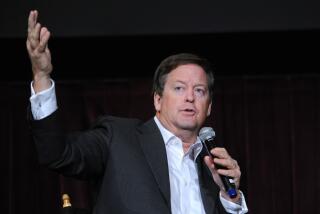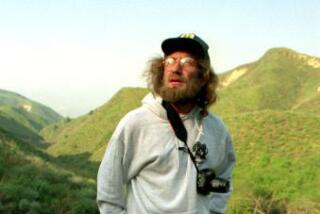Sidney W. Fox; Analyzed First Moon Rocks
Sidney W. Fox, 86, one of the first scientists to analyze moon rocks. Born in Los Angeles, Fox earned a degree in chemistry at UCLA and a doctorate at Caltech. He did postdoctoral work at the Linus Pauling laboratory and Pauling remained a lifelong friend and mentor. Fox worked at Cutter Laboratories, developing vitamin A isolated from shark livers to enhance night vision of pilots during World War II. An expert on proteins, Fox created a protein chemistry diagnostic laboratory at the University of Michigan Medical School, did research on fish meal protein for a fishery in Oakland and taught at Iowa State College. After nine years as director of the Oceanographic Institute at Florida State University, Fox moved to the University of Miami, where he spent 25 years as director of the NASA-supported Institute for Molecular Evolution. There he and his staff of researchers conducted analyses of the first rock samples brought back from the moon. In 1989, Fox moved to Southern Illinois University, and as an octogenarian moved to Mobile, Ala., in 1993 to continue his work as distinguished research scientist in the Department of Marine Sciences at the University of South Alabama. On Monday in Mobile.
Karl Hubenthal; Award-Winning Editorial Cartoonist
Karl Hubenthal, 81, syndicated editorial cartoonist for the Hearst newspapers and the defunct Los Angeles Herald Examiner. Hubenthal began newspaper cartooning in sports at the old Los Angeles Evening Herald-Express when he was 17. Within four years he was named sports cartoonist of the year at the New York World’s Fair. He served in the Marine Corps during World War II and afterward worked as a commercial illustrator in New York and Los Angeles. In 1949, William Randolph Hearst personally persuaded him to become the chain’s editorial cartoonist. His work appeared nationally for 33 years. Before his retirement in 1982, Hubenthal had earned the National Cartoonist Society’s “Reuben” plaque seven times, Freedom Foundation medals 25 times, the National Headliners Award and the Helms Foundation medal. The cartoonist served as president of both the Society of Illustrators and the Assn. of American Editorial Cartoonists and was regional director of the National Cartoonists Society. His papers and most of his drawings are divided among the University of Wisconsin, Ohio State University and the International Museum of Cartoon Art in Boca Raton, Fla. During his retirement, Hubenthal turned to painting and displayed his work at galleries in California and Arizona. On Thursday in Los Angeles.
M. Jack London; Radio Executive, L.A. County Aide
M. Jack London, 81, radio executive and Los Angeles County aide. During World War II, London helped develop the Armed Forces Network, which provided radio entertainment for troops stationed in Europe. Years later, he became news director at Los Angeles’ KABC Radio, earning several Golden Mike awards for the station during the 1970s. He also served as president of the Radio and Television News Directors’ Assn. He moved into the public sector as field deputy to Los Angeles County Supervisor Baxter Ward, with whom he had worked in radio. London later worked as special assistant in the county Department of Public Social Services. He also taught journalism at Cal State Northridge. A resident of the San Fernando Valley for more than half a century, London was a major fund-raiser for charities, including United Way and the Brotherhood Crusade. On Tuesday in Los Angeles.
Miguel Ribera; Volunteer in Reno Latino Community
Miguel Ribera, 82, Reno restaurateur and philanthropist who aided Latinos. Ribera opened Reno’s first Mexican restaurant in 1956. Still in operation, Miguel’s Mexican Food is now run by his daughter, Antonia Parks. Ribera worked all his life to help other Latinos achieve their dreams. He gave a scholarship to Emma Sepulveda, enabling her to attend college; she is now a professor at the University of Nevada at Reno. Ribera also volunteered his time at an elementary school. His contributions were recognized last year when a park was named for him. A diabetic, Ribera lost both legs to amputation in 1996. On Friday in Reno of complications of diabetes.






